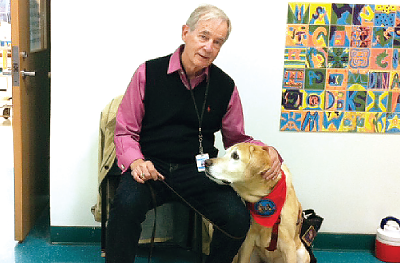Newtown Organizes MH Services For the Long Term
Abstract
Mental health providers in Newtown, Conn., collaborate to plan long-term care for townspeople after December’s deadly school shooting.
The big St. Bernard lay on the floor in the hallway, waiting to have its belly rubbed.

Irvin Jennings, M.D., supervises Mikey the Therapy Dog at the Reed Intermediate School in Newtown, Conn., after the shooting at Sandy Hook Elementary School in December
True, St. Bernards aren’t part of the standard psychiatry residency, but this one and 14 other canines of varying breeds joined the resources gathered in the family assistance center set up in Newtown, Conn., after the shooting rampage last December that left 20 children and seven adults dead.
A therapy-dog organization brought the St. Bernard and friends, Save the Children set up an arts-and-crafts room, and three mental health organizations provided more-conventional care at the Reed Intermediate School in Newtown.
Wellmore, a mental health services organization with expertise in mobile crisis services; Danbury Hospital; and Family and Children’s Aid (FCA) collaborated on operating a site to which people affected by the tragedy could go for therapy or just a sympathetic ear, said FCA’s executive and medical director, Irvin Jennings, M.D.
“What evolved was a wonderful model,” Jennings told Psychiatric News. “It was part grief counseling and part kids’ play area.”
Each organization had staff members there every day for the following week, with FCA doing administrative work (like vetting the credentials of volunteer counselors) as well as providing clinical services. The dogs “just showed up,” said Jennings. Kids could pet the dogs or do art projects while their parents talked with counselors. The center logged at least 1,350 encounters in its first 10 days of operation.
Even the dogs played well together, he said.
Eventually, a collection of town and state agencies, along with representatives from the school district and local government, coalesced with the three groups running the crisis center into a coordinating council, said Charles Herrick, M.D., chief of psychiatry at Danbury Hospital. The council is now assessing community needs and organizing the transition to longer-term services
“We hope to establish some kind of ongoing drop-in center to provide information and have clinicians available to do screening and refer as needed,” said Herrick in an interview. “Our plan is to build capacity with trained clinicians.”
The council will start by creating a list of three sets of clinicians: those who are already seeing affected children and families, those with specific training in trauma-focused care, and those who will need training in such care.
Psychologist Stephen Marans, Ph.D., of the Yale Child Study Center, and Steven Southwick, M.D., a posttraumatic stress disorder specialist at the West Haven Veterans Affairs Medical Center, will lead the training.
Danbury Hospital has only a small child and adolescent psychiatry department, so it will concentrate on adult services while linking younger people to primary care physicians, he said. The hospital will train the latter to use screening tools and look for somatic complaints in children that may have been triggered by the event.
In the longer term, coordination for local resources will be managed by Newtown Youth and Family Services, said Jennings. Local resources should be adequate to serve those who need services.
“This is a pretty therapy-rich area, between private practices and nonprofit agencies,” he said. “People in Newtown want to stay in Newtown, so we’re trying to be sensitive to that view.”
The coordinating council must build for the long term, said Herrick. At one early meeting, a state official reported that health officials from Colorado’s Columbine High School and Aurora, Colo., scenes of previous mass shootings, had called to offer support. They also noted that people in those towns reexperienced their own tragedies when they heard about Newtown.
“So we have to make a longstanding commitment in our community to have services available,” said Herrick.
Perhaps that will also mean having that St. Bernard on call. ■
The Newtown Youth and Family Services’ Web site is http://www.newtownyouthandfamilyservices.org.



